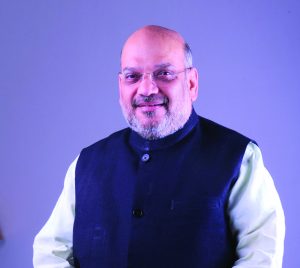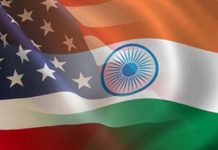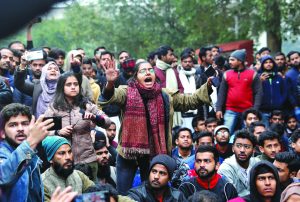 Within no time after students at Jamia Millia Islamia and Aligarh Muslim University faced brutality of police attack for protesting against the Citizenship (Amendment) Act, 2019, student community across the country have come on the streets to express solidarity, widening protest base to pan-India level. Angry protests have been reported from Delhi, Uttar Pradesh, Kerala, Madhya Pradesh, Telangana, Karnataka and West Bengal. Assam and entire North East has been in the grip of violent protests ever since the Citizenship Amendment Bill, 2019, introduced and passed in the parliament. The incidents of violence have spurt all over the country especially in Assam and national capital region.
Within no time after students at Jamia Millia Islamia and Aligarh Muslim University faced brutality of police attack for protesting against the Citizenship (Amendment) Act, 2019, student community across the country have come on the streets to express solidarity, widening protest base to pan-India level. Angry protests have been reported from Delhi, Uttar Pradesh, Kerala, Madhya Pradesh, Telangana, Karnataka and West Bengal. Assam and entire North East has been in the grip of violent protests ever since the Citizenship Amendment Bill, 2019, introduced and passed in the parliament. The incidents of violence have spurt all over the country especially in Assam and national capital region.
Anger over the police crackdown in Delhi’s Jamia Millia Islamia and at the controversial Citizenship Amendment Act cascaded across many campuses in the country on Tuesday, with politicians and civil society supporting the students to decry what they call an unconstitutional draconian law. India Gate has once again become the center of protests, where civil society is gathering to lodge protest against arbitrary and divisive law enactment that in coming time could disintegrate society on religious faiths. After Lokpal and Nirbhaya agitation, protests are gaining ground in most of the state capitals as well.
The Supreme Court of India December 17 refused to entertain petitions seeking arrest stay of the students and judicial inquiry into police action during anti-CAA protests at Jamia Millia Islamia and Aligarh Muslim University. The apex court relegated them to approach respective High Courts within whose jurisdiction the incidents of violence have occurred.
The Commonwealth Human Rights Initiative (CHRI) has issued a statement saying the police who “were complicity in perpetrating violence” against the students of Jamia Millia deserve “strict action”.
Thousands of students demanding action against Delhi police cops continued protesting on the streets. They wanted probe into the use of teargas inside the Jamia’s library on December 15 as well as police entering the campus without permission from the university authorities. The students all over the country are outraged against police action on them.
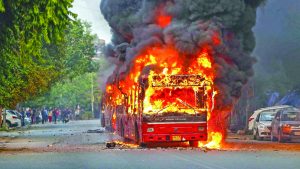 Protests against the Citizenship Amendment Act took a violent turn in Delhi’s Seelampur on December 17 as protesters clashed with the police, who used tear gas shells to disperse them, citing stone pelting by some protesters. “A police station was damaged amid protests over Citizenship Amendment Act in the Seelampur area of Delhi. Initially, protest was peaceful but suddenly violence erupted while they were dispersing,” the Delhi police said.
Protests against the Citizenship Amendment Act took a violent turn in Delhi’s Seelampur on December 17 as protesters clashed with the police, who used tear gas shells to disperse them, citing stone pelting by some protesters. “A police station was damaged amid protests over Citizenship Amendment Act in the Seelampur area of Delhi. Initially, protest was peaceful but suddenly violence erupted while they were dispersing,” the Delhi police said.
Addressing a poll rally in Jharkhand on December 17, Prime Minister Narendra Modi said that the Congress party is instigating Muslims over Citizenship Amendment Act, for political purposes,reiterating that the CAA would not affect any bonafide citizen of any religion.He termed the violence “unfortunate” and “deeply depressing.” Attacking the Opposition, “some parties are trying to “instigate” students and using them as “pawns” to further their petty political interests,” he said.
Union Home Minister Amit Shah said that the Opposition is misleading the country over the Citizenship Amendment Act.“Entire opposition is misleading the people of country. I reiterate that there is no question of taking away citizenship of any person from any minority community. There is no such provision in the bill,” he said.“I want to say to Congress party that this was part of Nehru-Liaquat pact but was not implemented for 70 years because you wanted to make a vote bank. Our government has implemented the pact and given citizenship to lakhs and crores of people,”in a scathing attack Shah commented.
On the other hand, Modi government is facing tough opposition even from his old friend turned foe, Shiv Sena chief and Maharashtra CM Uddhav Thackeray who despite supporting CAB a few days ago in the parliament,criticized police actionsaying, “What happened at Jamiais like anotherJallianwalaBagh.”
Opposition leaders from 13 political parties led by Congress president Sonia Gandhi on December 17 met President Ram Nath Kovind over police action in Jamia amid turbulence over Citizenship Amendment Act across the country. The delegation demanded the president to safeguard the constitution of India by advising the government to withdraw (Repeal) Citizen Amendment Act 2019. They also demanded to set up commission of enquiry to ensure all those guilty of perpetuating violence in whatever form be brought to book.
The delegation asserted in a memorandum, “The state must realise that citizens do not have the capacity to challenge the state and only way they can express their opposition is through peaceful protests. If legitimate constitutional right to protest is sought to be muzzled in this fashion, our democracy will be destroyed.”
“We exhort you to protect the federal structure of the nation and to ensure that this federal structure is not disturbed by government of India by abusing state power,” delegation stressed.
The signatories to memorandum include Sonia Gandhi, AK Antony, Ghulam Nabi Azad, Ahmed Patel, Anand Sharma, Kapil Sibbal, Jairam Ramesh, (all from Congress), TR Balu (DMK), Derek O’Brien (AITMC), Ram Gopal Yadav and Javed Ali Khan(SP), SitaramYechoori (CPI-M), D.Raja(CPI), Sharad Yadav (LJD), Prof. Manoj Jha (RJD), ET Mohd Basheer (IUML) Justice Hasnain Masoodi (JKNC), Sirajuddin Azmal (AIUDF) and Shatrujeet Singh (RSP).
“The situation in the Northeast which is now spreading throughout the country including the capital because of the act, is a very serious situation, we fear that it may spread even further.We’re anguished at the manner in which police dealt with peaceful demonstration,”observed Congress chief Sonia Gandhi. “We’ve an example in Delhi where Police entered the Jamia women hostel, dragged them out and mercilessly beaten them.I think you all have seen that Modi government seems to have no compassion when it comes to shutting down people’s voices and implement legislation,” she added.
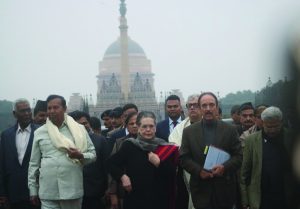 Earlier Congress leaders Ghulam Nabi Azad and Kapil Sibal, CPI(M) leader Sitaram Yechury, CPI’s D Raja, RJD’s Manoj Jha, SP’s Javed Ali Khan and Sharad Yadav condemned December 17’s police action against Jamia students who were protesting against the CAA. “How could the police enter Jamia and unleash such brutality on the students when university authorities did not allow the police to enter inside. There should be a judicial probe into the violence against students by police in the Jamia campus,” said Azad.
Earlier Congress leaders Ghulam Nabi Azad and Kapil Sibal, CPI(M) leader Sitaram Yechury, CPI’s D Raja, RJD’s Manoj Jha, SP’s Javed Ali Khan and Sharad Yadav condemned December 17’s police action against Jamia students who were protesting against the CAA. “How could the police enter Jamia and unleash such brutality on the students when university authorities did not allow the police to enter inside. There should be a judicial probe into the violence against students by police in the Jamia campus,” said Azad.
Demanding a judicial inquiry, Bahujan Samaj Party chief Mayawati appealed to all communities to maintain calm after violence reported from both the universities. “The violence and protest against the Citizenship (Amendment) Act, first in Aligarh and then in Jamia, where many innocent students and commoners were targeted, is very unfortunate and the BSP stands with the victims,” Mayawati tweeted.
The family rift in first family of Samajwadi Party (SP) is yet to be over despite best efforts of its patriarch Mulayam Singh Yadav to overcome conflicts among them. While it’s national president Akhilesh Yadav is opposing the Citizenship Amendment Act and NRC but the younger daughter-in-law of Mulayam Singh Yadav, Aparna Yadav has supported NRC. Aparna Yadav tweeted on the Citizenship Amendment Bill and NRC, saying, “What is the problem of being registered in the register of what belongs to India?”SP urged the government to requisition of an emergency Session of Parliament to carry out an amendment to ensure no discrimination remains in Citizenship Amendment Act. SP opposed the Citizenship Amendment Bill in Lok Sabha and Rajya Sabha. Samajwadi chief Akhilesh Yadav tweeted after Jamia students beaten up by Delhi police, “The BJP government has pushed the country into an inferno of violence by its destructive law. It is inflicting fatal injuries on the future of the country. It is said that when people start losing, they become oppressive.” He alleged that the country has not seen a “power-hungry” party like the BJP before.
Delhi Police said that 10 people have been arrested in relation to the violence in Jamia Millia Islamia University on December 15 but none of them happens to be its students. Later a Delhi court sent them to judicial custody until December 31. The Metropolitan Magistrate Kamran Khan earlier sent six of the 10 arrested people — Mohammad Hanif, Danish alias Jafar, Sameer Ahmed, Dilshad, Shareef Ahmed, Mohd Danish — to judicial custody after police sought their custodial interrogation for 14 days.
With evacuating the hostels immediately, both the universities declared closed until January 5, 2020, to defuse tension and high tempers of the protesting students for avoiding untoward incidents of violence. “Internet services in Aligarh, Saharanpur and Meerut stood suspended, a day after protests broke out in certain parts of the State, including at AMU, against the amended citizenship law,”briefing the media DGP OP Singh said. The government has also directed district administration to keep vigil on social media and see no posts or rumorsinstigating communal passions spoilingpeaceand harmony circulate in their areas.
Retaliatory protests in more than 16 universities and IITs broke out against police atrocities on the students of Jamia Millia Islamia and Aligarh Muslim University, who were demanding revocation of Citizenship Amendment Act. The agitation sparked at North campus of Delhi University in front of the Faculty of Social Science, with several students reportedly deciding to boycott exams and hold protests in solidarity with their counterparts in JMI and AMU. Trouble erupted there, when armed members of the Akhil Bharatiya Vidyarthi Parishad (ABVP) came with police cover and started beating the protesters black and blue using batons.
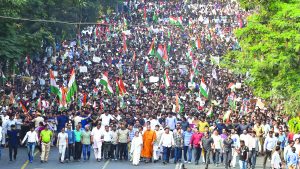 Students took out processions from Nadwa College, a renowned center of Islamic studies, Lucknow amid mild scuffle and brick batting with local police. Nadwa College students gathered in hundreds shouting slogans like Awaz do, hum ek hain (call us we are all united). Police controlled the situation; notwithstanding they hurled stones at the police who pushed them back inside the campus gate.
Students took out processions from Nadwa College, a renowned center of Islamic studies, Lucknow amid mild scuffle and brick batting with local police. Nadwa College students gathered in hundreds shouting slogans like Awaz do, hum ek hain (call us we are all united). Police controlled the situation; notwithstanding they hurled stones at the police who pushed them back inside the campus gate.
Lucknow police arrested district secretary of All India Majlis-e-Ittehad-ul-Muslimeen(AIMIM) Aziz-Ur-Rehmanfor bringing out procession on Citizenship Amendment Act near Ghantaghar under Husainabad area of old Lucknow. Police is also in look out for other participants.
Angry protests were marked at Maulana Azad National Urdu University (MANUU) Hyderabad, Banaras Hindu University (BHU) Varanasi, Jadavpur University, Kolkata, Tata Institute of Social Sciences (TISS) Mumbai, Central University of Kerala, Kasargod and Pondicherry University. Students from the Mumbai University, Patiala’s Punjab University and Patna University also held protests.
Students from three Indian Institutes of Technology (IITs) in Kanpur, Madras and Bombay, Indian Institute of Science (IISc) in Bengaluru and IIM Ahmedabad among others also joined the protests besides the Delhi University where students boycotted exams and held a protest outside the Faculty of Social Sciences in North Campus to express their solidarity with the movement.
The students of Banaras Hindu University (BHU) in Varanasi and at the Jadavpur University in Kolkata demanded that the governmenttake action against police “hooliganism”. In Bengaluru, civil society assembled to protest Jamia violence and CAA near Town Hall and led a procession towards Freedom Park, but the police did not allowed their march. The protesters remarked, “We cannot allow government to divide us on gender or religion.”
Down south, in Hyderabad (Telangana), students of Maulana Azad Urdu University, the University of Hyderabad (UoH) and the Osmania University, staged sit-in inside their campuses, holding placards. Besides IIT-Madras, students of educational institutions in Tamil Nadu, including the Loyola College in Chennai and the Central University of Tamil Nadu at Tiruvarur, held protest demonstrations. Over 300 students and citizens staged a protest at the Savitribai Phule Pune University (SPPU) campus on December 16 evening.
In Trivandrum, water cannons were used on the protesters who were demanding rethink and scrap the CAA. Police detained 70 protesters there.
The AMU campus is under heavy patrolling and strict surveillance, being communally sensitive place of Uttar Pradesh. AMU Registrar Abdul Hamid said that the police entered the campus late December 15 night and clashes were reported from inside. The police arrested 21 persons in connection with the students-police clash at the AMU. “Named FIR has been lodged against 56 persons and others unidentified. The process of hostel evacuation is on and 25-30 per cent of them have been vacated, rest expected to be vacated by December 17 evening,” SSP (Aligarh) Akash Kulhary said.
The Citizenship (Amendment) Act grants Indian citizenship to six non-Muslim communities — Hindus, Sikhs, Buddhists, Jains, Christians and Parsis — from Pakistan, Bangladesh and Afghanistan if they came to India before 2014. It has been widely criticised as being openly communal and anti-Muslim.
In Assam, five people have lost their lives after the police opened fire on protesters at different spots. The Northeast has been seeing large-scale protests against the Act, as people feel indigenous cultures and livelihoods will be under threat if immigrants from Bangladesh are granted citizenship. The Act also violates the Assam Accord of 1985.
Charges under the amended Unlawful Activities (Prevention) Act have been filed against Assam leader Akhil Gogoi, who was arrested in the second week of December. Under the new law, the Centre could label him as a “terrorist” without any opportunity of hearing. The peasant leader Gogoi was arrested from Jorhat district for “waging a war against the nation, conspiracy and rioting,” in a fresh case registered by the NIA recently. Hewas participating in a protest against the Citizenship Amendment Act.
In other parts of the Assam, protests continued against the Citizenship (Amendment) Act (CAA). Thousands joined in a massive protest against the CAA organised by poets, artists, film stars, musicians, intellectuals, choreographers, singers, song writers and others joined by denizens of the city at the Assam Engineering Institute at Chandmari in Guwahati.
Two more people succumbed to bullet injuries on Sunday when police resorted to firing after protests took a violent turn. Eshwar Nayak from Udalguri district, who was working at a clothing retail store, was returning home at Downtown locality when he was struck by bullet. He was later shifted to the GMCH, where he succumbed to his injuries on December 15. Another person, Abdul Alameen also succumbed to bullet injuries on December 15. The police shot him at Lalungaon area of Guwahati. Assam DGP confirmed that four people were killed in police action in the state.
The country is reeling through very difficult phase. Its economy is shrinking. Inflation is going all time high. Price rise of essential commodities is hitting the sky. And engineering production is slowing down resulting in mass unemployment, we cannot effort inner conflicts and resultant discriminations and disintegration of our age-old coherent social structure that nurtured the constitutional aim to provide equity, freedom and political, economic and social justice to all.
Myth & Reality
1) Myth: Citizenship Amendment Act will provide citizenship to Bengali Hindus
Fact: Citizenship Amendment Act does not automatically confer Indian citizenship to Bengali Hindus. It is just an enabling legislation for persons belonging to six minority communities of Afghanistan, Pakistan and Bangladesh. It has been proposed on extremely
humanitarian grounds as these minorities had fled from these three countries due to persecution on grounds of their religion.
2) Myth: Citizenship Amendment Act dilutes ‘Assam Accord’
Fact: Citizenship Amendment Act does not dilute the sanctity of the Assam Accord as far as the cut-off date of March 24, 1971, stipulated for detection/deportation of illegal immigrants is concerned.
3) Myth: Citizenship Amendment Act is against the interest of indigenous people of Assam.
Fact: Citizenship Amendment Act is not Assam-centric. It is applicable to the whole country. Citizenship Amendment Act is definitely not against National Register of Citizens (NRC), which is being updated to protect indigenous communities from illegal immigrants.
4) Myth: Citizenship Amendment Act will lead to domination of Bengali speaking people.
Fact: Most of the Hindu Bengali population is settled in Barak Valley of Assam, where Bengali is declared the second State language. In Brahmaputra Valley, Hindu Bengalis are settled in isolated pockets and have adapted themselves to Assamese language.
5) Myth: Bengali Hindus will become burden for Assam.
Fact: Citizenship Amendment Act is applicable to the whole country. Persons facing religious persecution are not settled only in Assam. They are staying in other parts of the country as well.
6) Myth: Citizenship Amendment Act will trigger fresh migration of Hindus from Bangladesh.
Fact: Most of the minorities have already migrated from Bangladesh. Moreover, the scale of atrocities on them in Bangladesh has been coming down in recent years. In the changed scenario, large-scale migration on account of religious persecution is now a remote possibility. Further, there is a cut-off date of December 31, 2014 and benefits under Citizenship Amendment Bill will not be available for members of the religious minorities who migrate to India after the cut-off date.
7) Myth: Citizenship Amendment Act is a ploy to grab tribal land by accommodating Hindu Bengalis.
Fact: Hindu Bengalis are mostly settled in Barak Valley, away from tribal belts and blocks. Further, Citizenship Amendment Bill does not contradict laws and regulations for protection of tribal lands. Citizenship Amendment Bill is not applicable in areas where provisions of ILP and sixth schedule of the Constitution apply.
8) Myth: Citizenship Amendment Act is discriminatory against Muslims.
Fact: Any foreigner of any religion from any country can apply for Indian citizenship if he/she is eligible to do so as per the existing provisions of the Citizenship Act, 1955. The Citizenship Amendment Act does not change these provisions at all. It only enables migrants of six minority communities from three countries to apply for Indian citizenship if they meet the given criteria.
Frequently Asked Questions
Does the Citizenship Amendment Act affect any of the Indian citizens?
No
Whom does it apply to?
Only to Hindus, Sikhs, Jains, Buddhists & Christians from 3 countries who are facing religious persecution in those countries and who are already in India (before 1st Dec 2014).
Which are these 3 countries?
Pakistan, Bangladesh & Afghanistan
In what way does it benefit Hindus, Sikhs, Jains & Christians from these 3 countries?
Their residency requirement has been reduced from 11 to 5 years. And they can claim citizenship as a right under this law
Does this mean that Muslims from these 3 countries can never get Indian citizenship?
No. But they will go thro’ the usual process of acquiring citizenship thro’ naturalization rules like 11 years of residence etc.
Will illegal Muslim immigrants from these 3 countries be automatically deported under CAA?
No. The usual process applies. Their application for naturalization may or may not be granted depending on their eligibility
Can Hindus facing persecution in other countries apply under this law?
No
Does CAA apply to other forms of persecution — political, racial, sexual etc?
No. The CAA is very specific in its intend — Hindus…religious persecution…3 countries
Why only these 3 countries?
These 3 countries have a track record of pervasive, systematic and institutionalized persecution of Hindus
What about Sri Lankan Tamils?
(1) The war has been over for the a decade now.
(2). There never was any persecution on religious lines. It was on racial lines.
(3) And over the decades of civil war the Sri Lankans have put an end to institutionalized discrimination of Tamils
Doesn’t India have an obligation under the UN to take care of refugees?
Yes it does. And it is not shying away from it. But it has no obligation to offer citizenship. Each country has its own rules for naturalization. India is not going to turn away other refugees under this law. It will play host to them under UN rules, in the implicit expectation that some day they will return to their homelands when the conditions improve. But in the case of Hindus from these 3 countries, this law acknowledges the reality that the environment of persecution in these 3 countries is never going to improve
Why shouldn’t Baluchis, Ahmediyas in Pakistan, Rohingayas in Myanmar not be considered for this kindness?
They may be considered under the existing laws and not under this special category.
The government is rock-firm to implement the Citizenship (Amendment) Act (CAA) and provide citizenship to non-Muslim refugees from three neighbouring countries
— Amit Shah,
Union Home Minister
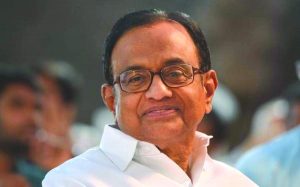 Why should we give citizenship to people who are already citizens of Pakistan? What is the meaning of such challenges to the Opposition. It is gratifying that students and the young generation are liberal, secular, tolerant and exhibit humanism. Is the government challenging these values
Why should we give citizenship to people who are already citizens of Pakistan? What is the meaning of such challenges to the Opposition. It is gratifying that students and the young generation are liberal, secular, tolerant and exhibit humanism. Is the government challenging these values
— P Chidambaram,
Senior Congress leader
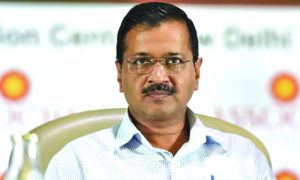 I want to ask what was the need of such a bill at this time. There is such widespread unemployment and inflation in the country, people are crying over jobs and goods getting costlier. The nation needs to look at these bigger problems instead of such an issue
I want to ask what was the need of such a bill at this time. There is such widespread unemployment and inflation in the country, people are crying over jobs and goods getting costlier. The nation needs to look at these bigger problems instead of such an issue
— Arvind Kejriwal,
Delhi Chief Minister
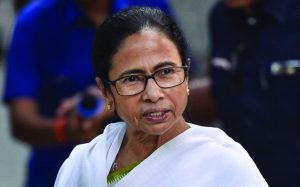 We will continue our protest till the Citizenship Amendment Act and NRC) are withdrawn. If you want to dismiss my government, you can, but I will never allow CAA in Bengal. If they want to implement CAA, they will have to do it over my dead body
We will continue our protest till the Citizenship Amendment Act and NRC) are withdrawn. If you want to dismiss my government, you can, but I will never allow CAA in Bengal. If they want to implement CAA, they will have to do it over my dead body
— Mamata Banerjee,
West Bengal Chief Minister
letters@tehelka.com

